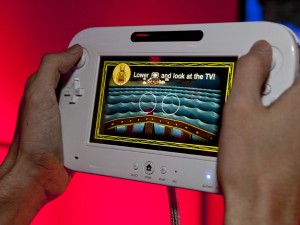
In this June 8, 2011 photo, Nintendo's video game console:Wii U is demonstrated at the Nintendo booth at the 2011 Electronic Entertainment Expo in Los Angeles. At this year's Electronic Entertainment Expo, Nintendo is expected to show off exactly what kinds of games will be available for its new touchpad-powered Wii U console, while other gamemakers will hype the latest installments in their "Call of Duty," "Halo" and "God of War" franchises. AP/DAMIAN DOVARGANES, FILE
SAN FRANCISCO – Sequels to blockbuster console titles and play on smartphones or tablets will be showcased with Times Square-like glitz starting Tuesday at the E3 videogame extravaganza in Los Angeles.
Nintendo will tout its coming Wii U console as well as videogames being tailored for play on the beefed up console it hopes will re-ignite passion sparked by its groundbreaking Wii devices released in 2006.
Microsoft has said that it will not unveil a successor to the US technology firm’s Xbox 360 console and Japan-based Sony said it will remain mum about a next-generation PlayStation 3.
Wii consoles introduced motion-sensing controllers that were a smash success and unlocked a vast audience of “casual gamers” enticed by the ability to play with simple gestures instead of having to master toggles and buttons.
That casual audience has been lured to inexpensive or free games that can be played on smartphones or tablets using swipes on touch-screens and by games enjoyed online at venues such as zynga.com or social network Facebook.
“The snack food type games thrive at the expense of casual games,” Wedbush Securities analyst Michael Pachter said, referring to social and mobile titles.
“They have hurt the Wii and the DS (Nintendo handheld game device) badly and taken away the casual gamer.”
Analysts doubt the Wii U will win over hardcore gamers or the casual crowd increasingly captivated by games played inexpensively on smartphones or tablets.
The absence of new Xbox or PlayStation consoles was cited as among the reasons that videogame publishers are betting on established franchises.
“This year, there are so many sequels and franchise reboots; the industry is sort of feeding on itself,” said John Davison, vice president of programming for videogame website GameSpot.com.
“Studios are trying to keep games fresh without regurgitating the same thing again and again,” he continued. “There is increasing appetite among gamers and game makers for new boxes.”
Hotly-anticipated titles include post-apocalyptic shooter “The Last of Us” from the studio that crafted the “Drake’s Uncharted” series and a revival of action game “Tomb Raider” by Square Enix.
Bethesda Softworks is building on its string of hits with supernatural assassin game “Dishonored,” and the ever-popular “Call of Duty” line will grow with a “Black Ops 2” installment.
France-based Ubisoft will add to its winning “Assassin’s Creed” franchise and Warner Brothers Interactive Entertainment is expected to wow with an “Injustice: Gods Among Us” fighting game starring DC Comics heroes and villains.
Along with showing off sequels to beloved franchises such as “Halo” and “Gears of War,” Microsoft is expected to emphasize the evolution of the Xbox 360 into a home entertainment center for movies, music, social networking and more.
Sony is likely to follow suit, touting the cornucopia of content available on PS3 and ability to synch the company’s array of gadgets and services.
“For console manufacturers, E3 is a chance to grab the world spotlight and shine it on what has traditionally been the core of the videogame business,” said Scott Steinberg, head of consulting firm TechSavvy and author of “The Modern Parent’s Guide to Kids and Video Games.”
“But, the most exciting things are happening in the free-to-play and mobile spaces.”
Social games star Zynga will be at E3 for the first time, albeit with a private meeting room off the show floor. Mobile game giant Gree is hosting a big bash for E3 attendees.
“At E3, the industry is being looked at in two pieces now — the software in a box costing millions of dollars to produce and the world of digital distribution, micro-transactions and mobile integration,” Davison said.
“Those two elements need to converge but they haven’t yet… You have your phone or tablet with you all the time; the competition is not just for audience dollars but for a share of their time.”
Blockbuster console games that have long defined E3 are not going away any time soon, analysts agreed, with some comparing it to Hollywood films still breaking box office records despite free television or online video.
“We have this world perception that the game industry is going to zero, and it is wrong,” Pachter said.